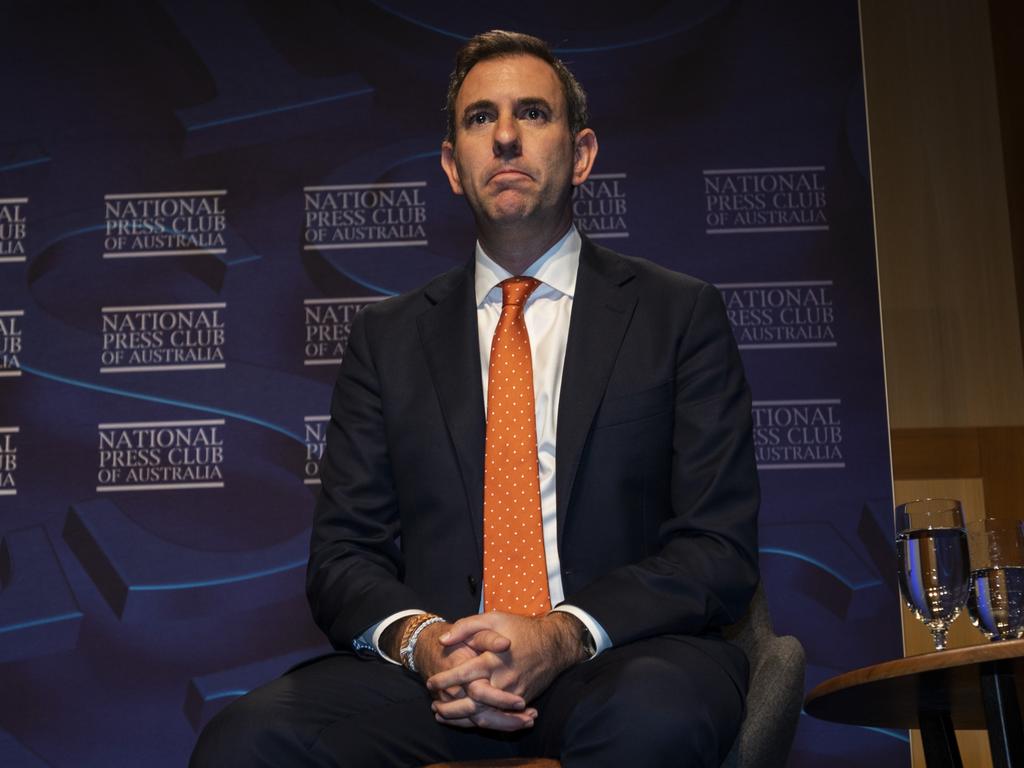Opportunity missed with Labor’s prudent budget
The ‘prudent’ budget didn’t add to the Reserve Bank’s task of slowing the economy to bring inflation under control, but it may have missed a much-needed fiscal reckoning.
The “prudent” budget may have been a missed opportunity
It didn’t add to the Reserve Bank’s task of slowing the economy to bring inflation under control, but the budget may have missed a much-needed fiscal reckoning.
The last thing markets wanted was the kind of unfunded loosening that sparked chaos in the UK bond market. If the domestic economy were to follow the UK, the EU, the US and Japan into expected recessions amid a massive lift in central bank policy rates and the impact of supply chain disruption in China and the Ukraine war, Jim Chalmers would be wise to keep something up his sleeve.
A blowout in September quarter inflation data relative to market expectations showed the RBA’s task is hard enough as it is. Several banks have added more rate hikes to their forecasts.
But the budget may have “missed what will arguably have been the best time cyclically to address Australia’s chronic budget problems”, says BetaShares chief economist David Bassanese.
He sees Australia’s ability to offer “Scandinavian-style levels of social welfare” with “US-style levels of taxation” coming under strain from reduced productivity growth, an outdated tax system, a new commitment to the NDIS, and a blowout in debt-servicing costs after the government racked up debt due to its fiscal support during Covid lockdowns.
“What’s missing most in the budget is more action on tackling Australia’s growing structural budget deficit gap,” Bassanese says. “As it stands, we already have an excess reliance on personal income tax, and too little reliance on spending and wealth taxes.”
With growth expected to slow significantly over the next few years, the macroeconomic environment for making tough decisions will only get harder, not easier in the years to come.
“Given today’s low level of unemployment, sky-high commodity prices and inflation pressures, cyclically, now is arguably the best time to engage in structural budget tightening – especially as this would have taken pressure off the RBA to lift interest rate too much further,” he says. “By waiting, the Treasurer faces a potential budget blowout over the next few years caused by a likely global recession – and attempting to structurally tighten the budget at that time would be counter-cyclical, aggravating the upward pressure on unemployment that we are likely to face.
“In short, the budget could be described as a case of delayed fiscal reckoning.”
Macquarie Equities sees “prudence in this budget in that the temptation for widespread cost of living subsidies was avoided, but the overall budget is at best neutral, not contractionary.”
A forecast $5bn rise in the deficit in FY23 is equivalent to 0.4 per cent of the sales and 0.2 per cent of the market capitalisation of the All Ordinaries index, so the direct impact is “not material”.
“Given the neutral impact of the budget, we still expect an earnings downgrade cycle over calendar 2023,” said Macquarie’s Australian equities strategist, Matthew Brooks. “But fiscal discipline will be tested when unemployment starts to rise.”
Unemployment benefits will provide some support, but he expects some political pressure for new measures as unemployment rises. Still, while direct cash handouts to consumers were used to stimulate growth during the GFC and Covid, this option may be constrained by inflation.
“The recent UK experience shows the consequences of unfunded spending,” Brooks says.
If inflation doesn’t slow materially, there may be no GFC/Covid-like “cash splash in 2023.”
But if it does happen, he thinks the supermarkets operators like Woolworths, Coles and Metcash might benefit more than discretionary retailers.
Brooks also notes that rising energy prices are expected to be a key driver of inflation in the next two years, and the government has suggested it may intervene.
Lower electricity and gas prices would be positive for consumers and building materials companies, but a risk for energy producers or retailers, and a reduction in energy prices may also reduce inflation and the terminal RBA cash rate.
Overall, the greater risk for equities right now is the global tightening of monetary policy, including quantitative tightening from the Fed, which is reducing liquidity.
Brooks sees headwinds for equities continuing until central banks shift to easing, which may not occur until unemployment replaces the cost of living as the key political concern.
Still, with no material policy surprises in the budget, UBS hasn’t altered its forecasts on equity market earnings, sector allocation, or its year-end target of 7000 points for the ASX 200, says the bank’s Australian equity strategist, Richard Schellbach.
He notes that some key challenges which corporates have been facing on labour and housing shortages were addressed, as the budget allocated $350m for 10,000 new homes as part of an accord with the private sector, and a pull-forward to migration rebounding to 235,000.
Labour availability challenges were the most frequently cited by companies at the recent August reporting season.
But despite this budget making some incremental positive adjustments on supply, in the near term labour shortages still threaten the ability of companies to deliver on customer demand.
Moreover, the industry-wide bargaining bill to be presented to parliament on Thursday may have a bigger impact on wages and profits, Schellbach says.
But despite a “gloomy” global outlook and supply constraints, he expects the “end-demand which ASX businesses are seeing is set to remain firm. This tug-of-war between soft global macro and more resilient domestic macro should keep equity market prices within a range.”








To join the conversation, please log in. Don't have an account? Register
Join the conversation, you are commenting as Logout